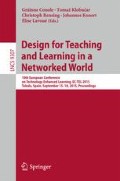Abstract
Competence-based Knowledge Space Theory (CbKST) is considered a well-fitting basis for adapting Serious Games (SGs). CbKST relies on the domain model associated to a given SG to infer the so-called competence structure. However, building such a model can be time-consuming and a tough task for experts. We propose another approach to overcome this issue by considering the Q-Matrix that contains the mapping between the SG activities and the addressed competences. We compare the two approaches, one based on the domain model and the other on the Q-Matrix, in three SGs. We apply both approaches to two SGs, while in a third one, we apply only the Q-Matrix approach since no domain model is available. The main findings when comparing both approaches refer to the issues derived from the generated competence structures and the definition of competences at a suitable granularity level. This exploratory work can provide meaningful insights when applying CbKST for adapting SGs.
Notes
- 1.
https://blockly-demo.appspot.com/static/apps/maze/index.html. (Last accessed 24 March 2015).
- 2.
http://seriousgames.lip6.fr/Cristaux_Ehere. (Last accessed 24 March 2015).
- 3.
http://games.cs.washington.edu/refraction/refraction.html. (Last accessed 24 March 2015).
References
Shute, V.J., Zapata-Rivera, D.: Adaptive educational systems. Adapt. Technol. Train. Educ. 7–27 (2012)
Bass, K.M., Glaser, R.: Developing Assessments to Inform Teaching and Learning. UCLA, Graduate School of Education and Information Studies, Los Angeles (2004)
Göbel, S., Wendel, V., Ritter, C., Steinmetz, R.: Personalized, adaptive digital educational games using narrative game-based learning objects. In: Zhang, X., Zhong, S., Pan, Z., Wong, K., Yun, R. (eds.) Edutainment 2010. LNCS, vol. 6249, pp. 438–445. Springer, Heidelberg (2010)
Csíkszentmihályi, M.: Flow : The Psychology of Optimal Experience. Harper Perennial, New York (1991)
Augustin, T., Hockemeyer, C., Kickmeier-Rust, M.D., Podbregar, P., Suck, R., Albert, D.: The simplified updating rule in the formalization of digital educational games. J. Comput. Sci. 4, 293–303 (2013)
Kickmeier-Rust, M.D., Göbel, S., Albert, D.: 80Days: melding adaptive educational technology and adaptive and interactive storytelling in digital educational games. In: International Workshop on Story-Telling and Educational Games, Maastricht (2008)
Kopeinik, S., Nussbaumer, A., Bedek, M., Albert, D.: Using CbKST for learning path recommendation in game-based learning. In: 20th International Conference on Computers in Education, pp. 26–30 (2012)
Peirce, N., Conlan, O., Wade, V.: Adaptive educational games: providing non-invasive personalised learning experiences. In: Presented at the 2nd IEEE International Conference on Digital Games and Intelligent Toys Based Education (2008)
Heller, J., Mayer, B., Albert, D.: Competence-based knowledge structures for personalised learning. In: 1st International ELeGI Conference on Advanced Technology for Enhanced Learning, Vico Equense-Naples, Italy (2005)
Kickmeier-Rust, M.D., Albert, D.: Micro adaptivity: protecting immersion in didactically adaptive digital educational games. J. Comput. Assist. Learn. 7, 95–105 (2010)
Korossy, K.: Modeling knowledge as competence and performance. In: Albert, D., Lukas, J. (eds.) Knowledge Spaces: Theories, Empirical Research, and Applications, pp. 103–132. Lawrence Erlbaum Associates, Inc., Mahwah (1999)
Falmagne, J.-C., Cosyn, E., Doignon, J.-P., Thiéry, N.: The assessment of knowledge, in theory and in practice. In: Missaoui, R., Schmidt, J. (eds.) Formal Concept Analysis. LNCS (LNAI), vol. 3874, pp. 61–79. Springer, Heidelberg (2006)
Tatsuoka, K.K.: Rule space: an approach for dealing with misconceptions based on item response theory. J. Educ. Meas. 20, 345–354 (1983)
Reimann, P., Kickmeier-Rust, M., Albert, D.: Problem solving learning environments and assessment: a knowledge space theory approach. Comput. Educ. 64, 183–193 (2013)
Pavlik Jr., P.I., Cen, H., Koedinger, K.R.: Learning factors transfer analysis: using learning curve analysis to automatically generate domain models. In: Proceedings of the 2nd International Conference on Educational Data Mining, pp. 121–130 (2009)
Desmarais, M.C., Baker, R.S.: A review of recent advances in learner and skill modeling in intelligent learning environments. User Modell. User-Adapted Interac. 22, 9–38 (2011)
Play Serious Project. http://www.playserious.fr/
IEEE-CS and ACM Computing Curricula 2001: Computer Science. http://www.acm.org/education/curric_vols/cc2001.pdf
Melero, J., El-Kechaï, N., Labat, J.M.: What’s next? Different strategies considering teachers’ decisions for adapting learning paths in serious games. In: Proceedings of the 7th International Conference on Computer Supported Education, pp. 101–108 (2015)
Acknowledgements
This work was supported in part by the Region Ile de France and by the French Ministry for the Economy, Industry and Employment (FUI). We would like to thank them for their support in the “PlaySerious” project. The authors would like to thank John Wisdom and Bertrand Marne for their very helpful support.
Author information
Authors and Affiliations
Corresponding author
Editor information
Editors and Affiliations
Rights and permissions
Copyright information
© 2015 Springer International Publishing Switzerland
About this paper
Cite this paper
Melero, J., El-Kechaï, N., Labat, JM. (2015). Comparing Two CbKST Approaches for Adapting Learning Paths in Serious Games. In: Conole, G., Klobučar, T., Rensing, C., Konert, J., Lavoué, E. (eds) Design for Teaching and Learning in a Networked World. EC-TEL 2015. Lecture Notes in Computer Science(), vol 9307. Springer, Cham. https://doi.org/10.1007/978-3-319-24258-3_16
Download citation
DOI: https://doi.org/10.1007/978-3-319-24258-3_16
Published:
Publisher Name: Springer, Cham
Print ISBN: 978-3-319-24257-6
Online ISBN: 978-3-319-24258-3
eBook Packages: Computer ScienceComputer Science (R0)

